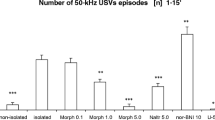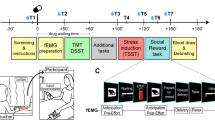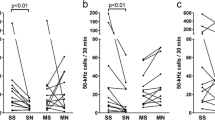Abstract
The present experiments evaluated the influence of intraventricular μ and δ opioid receptors on affective vocal and reflexive responses to aversive stimuli in socially inexperienced, as well as defensive and submissive responses in defeated, adult male Long-Evans rats. Defeat stress consisted of: (1) an aggressive confrontation in which the experimental intruder rat exhibited escape, defensive and submissive behaviors [i.e., upright, supine postures and ultrasonic vocalizations (USV)], and subsequently, (2) protection from the resident stimulus rat with a wire mesh screen for 10–20 min. Defeat stress was immediately followed by an experimental session with tactile startle (20 psi). The μ opioid receptor agonists morphine (0.1–0.6 μg ICV) and [D-Ala2-N-Me-Phe4-Gly5-ol]-enkephalin (DAMGO; 0.01–0.3 μg ICV), and the δ opioid receptor agonist [D-Pen2,5]-enkephalin (DPDPE; 10–100 μg ICV) dose-dependently decreased startle-induced USV and increased tail-flick latencies in socially inexperienced and defeated rats. Of greater interest, morphine, DAMGO and DPDPE increased the occurrence of the submissive crouch posture, and defeated rats were more sensitive than socially inexperienced rats to the startle-induced USV-suppressive and antinociceptive effects of morphine and DPDPE. The antinociceptive effects of DAMGO were likewise obtained at lower doses in defeated rats. Finally, the USV-suppressive effects of morphine and DAMGO were reversed with the μ receptor antagonist naltrexone (0.1 mg/kg IP), but the USV-suppressive effects produced by DPDPE were not reversed with the δ receptor antagonist naltrindole (1 mg/kg IP). These results confirm μ, but not δ opioid receptor activation as significant in affective vocal, passive-submissive behavior, as well as reflexive antinociception. Furthermore, similar to previous studies with restraint and electric shock stress, the facilitation of μ opioid effects on vocal responses and antinociception is consistent with the proposal that defeat stress activated endogenous opioid mechanisms.
Similar content being viewed by others
Author information
Authors and Affiliations
Additional information
Received: 23 September 1997/Final version: 15 January 1998
Rights and permissions
About this article
Cite this article
Vivian, J., Miczek, K. Effects of μ and δ opioid agonists and antagonists on affective vocal and reflexive pain responses during social stress in rats. Psychopharmacology 139, 364–375 (1998). https://doi.org/10.1007/s002130050727
Issue Date:
DOI: https://doi.org/10.1007/s002130050727




